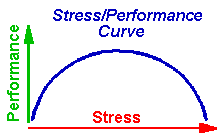Stress Management
Stress Management is an important part of daily living for everyone. We all need stress in order to survive. Teams need it to perform well, and in the right doses, it can be very healthy, or even enjoyable.However, when stress becomes excessive it can be very damaging. It can harm:
- health
- happiness
- work performance
- team spirit and co-operation
- relationships
- personal development
Stress management involves, at the simplest level:
- recognising the symptoms of stress
- identifying the causes
- taking action to address the causes and thereby reduce the symptoms
- where necessary, taking interim steps to relieve the symptoms until the underlying causes have been addressed.
For example, suppose 'overwork' is causing stress, which is resulting in headaches. If you only address the symptoms (eg: by taking pain killers to reduce the headaches), the stress remains, and the headaches will return. However, if you can restructure your work demands so that you are not overworked, the headaches will then disappear without the need for pain killers.
A further complication can arise in that some symptoms may be 'learned', and therefore removal of the underlying causes may not relieve the symptoms. For example, in the overwork example, the headaches might continue long after the problem of overwork has been addressed.
What are the signs of stress?
The symptoms of stress are many and varied, such as:- irritability
- headaches
- illness (particularly at weekends or during holidays)
- insomnia
- tiredness/lethargy
- and many more....
Sometimes, you can be experiencing stress but your mind and body are so good at hiding it from you that you are unaware of it. In such cases the symptoms might be more subtle and therefore difficult to recognise, such as:
- working endlessly without tiring
- having little feeling or emotion (except the occasional outburst of anger)
- increased use of alcohol, caffeine, cigarettes or other drugs (which may suppress feelings of stress)
- behaviour that is 'out of character'
- an inability to relax
If you are under a lot of stress for a prolonged period of time, but do not feel stressed, eventually it may catch up with you and cause more serious symptoms, such as:
- stomach ulcers
- heart problems
- minor illness (allergies, skin disorders, migraine)
- serious illness (eg: arthritis, cancer, diabetes)
- mental problems (eg: depression)
There may be cultural or social pressure to 'be strong'. Perhaps the employment culture is such that to acknowledge that you are under stress is interpreted as a sign of weakness and could be damaging to your career prospects. If this is the case, you may be tempted to suppress your feelings of stress - which leads to a strategy of stress denial rather than stress management.
Most people experience a significant period of stress or depression during their lives. To feel stressed at various times is to be normal.  If you think the stress may be excessive and you need help, then consult a suitably qualified professional (such as your doctor or a counsellor).
If you think the stress may be excessive and you need help, then consult a suitably qualified professional (such as your doctor or a counsellor).
The impact of excessive stress on teamwork is also harmful, and it can damage:
- individual work performance
- team performance
- working relationships
- cooperation between team members
- team spirit
In part two of this article, we will look at the causes of stress, and what can be done to deal with it.
Please note that this article has been written by team building consultants with a view to the effect of stress on team working. The authors are not medically qualified, and cannot give any medical advice by email. If you have any questions or concerns about your personal stress, you should consult a suitably qualified professional or expert in stress management.
©2013 Team Technology. Privacy policy and cookies.

